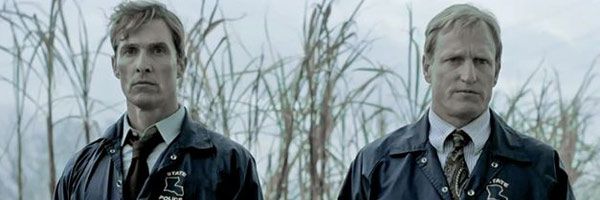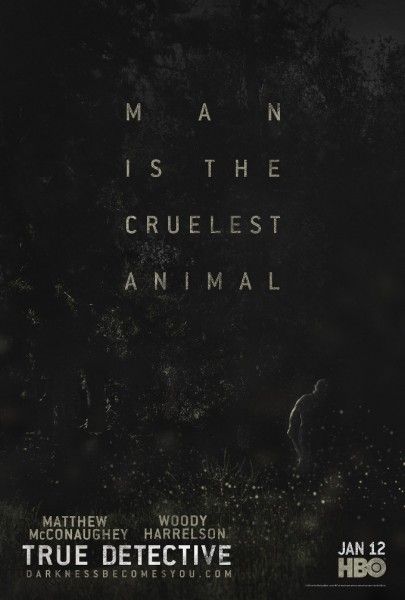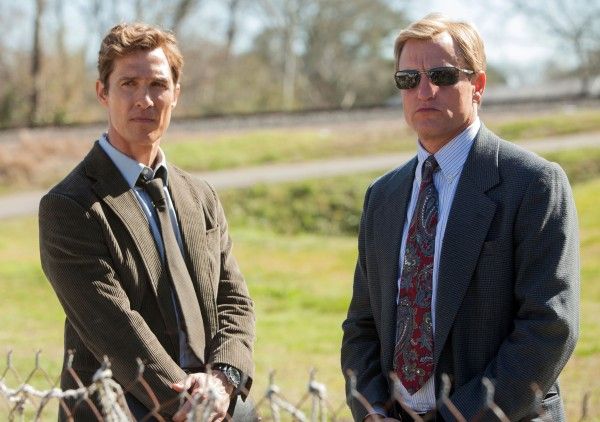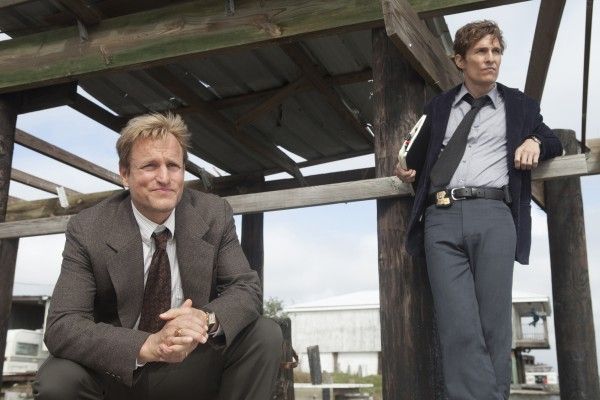There was a lot of discussion after last week's episode about what kind of show True Detective really is. Some felt kind of duped into believing it was a cop drama, before getting drawn into what has become an emotional and metaphysical slugfest of souls. But why do they have to be mutually exclusive? True Detective clearly gives time to both, and the point is that this crime triggered something in Martin and Rust that changed them, fundamentally, forever. Or to look at it another way, the crime facilitated, or even acted as an excuse, for them to go deep into their own darkness. Hit the jump for why I think we should talk, but you can buy the beer.
Every episode of True Detective has delivered something different. Sometimes there's visual experimentation, sometimes a deep look into the specific horrors of the main crime, and at other times, a loosening of Martin and Rust's grips on their own lives. "Haunted Houses" was of the latter variety, but it's a mistake to say that the crime isn't still the lynchpin of the series. Does the series, like for instance, BBC America's Broadchurch, go deep beyond the murder case in order to uncover and illuminate personal aspects of those tangential to it? Of course. But it also needs to have the most depraved evil at its center, to draw Martin and Rust so close to it and create that change within them.
"Haunted Houses" continued to illustrate aspects of revenge, denial and calculated badness that grows and twists like a vine around each character. Rust's obsession with the open-ended nature of the major crime, and the continued existence of The Yellow King, makes him manic in his quest for justice. We already saw, with the undercover op and shoot-out, and then the other shoot-out and cover-up, just how far Rust is willing to go in pursuit of the case. The "bad things" Rust might have been up to in the lost years could include harassing Billy Lee Tuttle, about whom we learned a lot more in this hour. In a short scene where Rust interrogates a woman who murdered her children, he tells her to kill herself. The detectives mention that Tuttle committed suicide after two break-ins. Has Rust been whispering suggestions to other depraved individuals?
The crime story evolved in the expected way this week: a connection to the forgotten people of the bayou, a string of "church schools" protected by private status and tax exemption, child pornography and a powerful hush up. These are the things we expect from a crime drama, and truth be told, their revelation was a little disappointing for just how expected it was. On the other hand, where True Detective has distinguished itself has been in its focus on the emotional lives -- and deterioration -- of its main characters, which hit hard again this week.
Maggie found her own connection to darkness by pointedly seducing Rust because she knew that would hurt Martin the most. Her trip to the bar on a mission to cheat reminded me of Betty Draper on Mad Men, the long-suffering wife of a philanderer who decided to get in on the apparent fun. But whereas Betty got what she went for with a stranger, Maggie backed off, and hatched a new plan, one with even deeper implications for Martin. The two of them behaved badly, but Maggie doubled-down when she involved Rust. Though he was already on the outs with the department and Martin, this sealed his fate. Again, the revelation that the falling out between Martin and Rust being Maggie was not a surprise; that groundwork has been laid since the beginning, with all of that "mowing another man's lawn" business. But it was how it happened, again, that set it apart. It wasn't a glittering, passionate love affair. It was a straight out quick fuck from behind, born from a desire to hurt. It made it ugly and dirty and different.
Though Martin is a dope (which Rust blatantly calls him out on), Rust still needs him and that connection to reality. And it's true that Rust could count on Martin as an ally (to a point). It was such a triumphant moment, even given all of the animosity and history, when the two connected after their respective interrogations. It's clear that Martin is still holding on to part of the emotion from that past, but his desire to not throw Rust under the bus to the investigators meant something. The case is not closed, and their work is not done.
Again, the open-ended nature of the crime is what still keeps Rust and Martin connected. We may not get an answer to what happens beyond it, but given that their narrative -- from 1995 to the present day -- as been defined by it, it seems to suggest there might be something that comes of the final episodes that feels like resolution. Though "Haunted Houses" played more by the rules than the last two episodes, it still had plenty to offer when it comes to both laying the groundwork for the reunification of Rust and Martin, but also regarding how that living darkness invades, exposes, and corrupts.
Episode Rating: A-
Musings and Miscellanea:
-- A nice callback in the episode from when Martin took his rings and jacket off to beat the tar out of the boys who had sex with Audrey, to after he knew Rust had had sex with Maggie.
-- The idea of this scar-faced giant is still terrifying, and poor catatonic Kelly's response to remembering his face completely horrific.
-- "Haunted Houses" was very reflexive this week, re-introducing the revivalist preacher as well as the underaged prostitute (now T-Mobile employee) Martin had saved long ago. It proves once again that nothing extraneous is introduced on the show. With only eight episodes to tell such an involved story, how could it?
-- Martin's bag of tampons made me laugh. Another reflexive moment, when the Major called him a "human tampon" later on.
-- Poor Rust. He's been too busy to fix that broken taillight on his car for the last 10 years!
-- Martin: "Getting laid was good for you." Rust: "Goddamn you, you moron."
-- "Marty never really knew himself, so he didn't know what he wanted" - Maggie, about Martin.
-- Martin is such a dumbass though, for real.
-- Per usual … is it next Sunday yet?!




